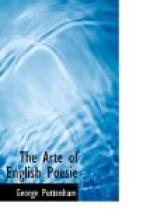thirdly to vse his metricall proportions, and last
of all to vtter with pleasure and delight, which restes
in his maner of language and stile as hath bene said,
whereof the many moodes and straunge phrases are called
figures, it is not altogether with him as with the
crafts man, nor altogither otherwise then with the
crafts man, for in that he vseth his metricall proportions
by appointed and harmonicall measures and distaunces,
he is like the Carpenter or Ioyner, for borrowing
their tymber and stuffe of nature, they appoint and
order it by art otherwise then nature would doe, and
worke effects in apparance contrary to hers. Also
in that which the Poet speakes or reports of another
mans tale or doings, as
Homer of
Priamus
or
Vlisses, he is as the painter or keruer that
worke by imitation and representation in a forrein
subiect, in that he speakes figuratiuely, or argues
subtillie, or perswades copiously and vehemently,
he doth as the cunning gardiner that vsing nature as
a coadiutor, furders her conclusions & many times
makes her effectes more absolute and straunge.
But for that in our maker or Poet, which restes onely
in deuise and issues from an excellent sharpe and
quick inuention, holpen by a cleare and bright phantasie
and imagination, he is not as the painter to counterfaite
the naturall by the like effects and not the same,
nor as the gardiner aiding nature to worke both the
same and the like, nor as the Carpenter to worke effects
vtterly vnlike, but euen as nature her selfe working
by her owne peculiar vertue and proper instinct and
not by example or meditation or exercise as all other
artificers do, is then most admired when he is most
naturall and least artificiall. And in the feates
of his language and vtterance, because they hold as
well of nature to be suggested and vttered as by arte
to be polished and reformed. Therefore shall
our Poet receaue prayse for both, but more by knowing
of his arte then by vnseasonable vsing it, and be
more commended for his naturall eloquence then for
his artificiall, and more for his artificiall well
desembled, then for the same ouermuch affected and
grossely or vndiscretly bewrayed, as many makers and
Oratours do.
The Conclusion.
And with this (my most gratious soueraigne Lady) I
make an end, humbly beseeching your pardon, in that
I haue presumed to hold your eares so long annoyed
with a tedious trifle so as vnlesse it preecede more
of your owne Princely and naturall mansuetude then
of my merite. I feare greatly least you may thinck
of me as the Philosopher Plato did of Anueris
an inhabitant of the Citie Cirene, who being
in troth a very actiue and artificiall man in driuing
of a Princes Charriot or Coche (as your Maiestie might
be) and knowing it himselfe well enough, comming one
day into Platos schoole, and hauing heard him largely
dispute in matters Philosophicall, I pray you (quoth
he) geue me leaue also to say somewhat of myne arte,




